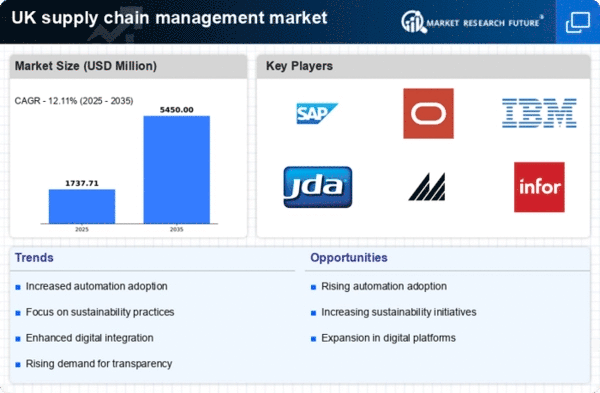E-commerce Growth
The rise of e-commerce is significantly influencing the supply chain-management market. With online shopping becoming a preferred choice for consumers in the UK, businesses are compelled to adapt their supply chains to meet the increasing demand for faster delivery and improved customer service. According to recent data, e-commerce sales in the UK are projected to reach £200 billion by 2025, necessitating a more agile and responsive supply chain. Companies are investing in logistics and distribution networks to ensure timely deliveries, which may lead to a transformation in traditional supply chain practices. This shift is likely to create new opportunities and challenges within the supply chain-management market.
Global Trade Dynamics
The dynamics of global trade are exerting a considerable influence on the supply chain-management market. Changes in trade policies, tariffs, and international relations can significantly impact supply chain operations. In the UK, businesses are navigating a complex landscape shaped by Brexit and evolving trade agreements. These factors compel companies to reassess their supply chain strategies, often leading to diversification of suppliers and logistics partners. The need for resilience in supply chains is paramount, as disruptions in one region can have cascading effects. As such, understanding and adapting to global trade dynamics is essential for companies operating within the supply chain-management market.
Focus on Cost Efficiency
Cost efficiency remains a pivotal concern for businesses operating in the supply chain-management market. In the UK, companies are under constant pressure to reduce operational costs while maintaining service quality. This has led to a heightened focus on optimizing supply chain processes, including procurement, inventory management, and logistics. Strategies such as just-in-time inventory and lean management are being increasingly adopted to minimize waste and enhance productivity. According to industry reports, organizations that implement cost-efficient practices can achieve savings of up to 20%. As competition intensifies, the drive for cost efficiency is likely to shape the future of the supply chain-management market.
Technological Advancements
The supply chain-management market is experiencing a notable shift due to rapid technological advancements. Innovations such as artificial intelligence (AI), machine learning, and blockchain are enhancing operational efficiency and transparency. In the UK, companies are increasingly adopting these technologies to streamline processes, reduce costs, and improve decision-making. For instance, AI-driven analytics can optimize inventory management, potentially reducing excess stock by up to 30%. Furthermore, the integration of blockchain technology is expected to enhance traceability, thereby increasing consumer trust. As these technologies evolve, they are likely to reshape the landscape of the supply chain-management market, driving companies to invest in digital solutions to remain competitive.
Consumer Demand for Transparency
In the current landscape, consumers are increasingly demanding transparency regarding the sourcing and production of goods. This trend is particularly pronounced in the UK, where consumers are more inclined to support brands that demonstrate ethical practices. As a result, the supply chain-management market is adapting to these expectations by implementing more transparent processes. Companies are utilizing technologies such as blockchain to provide real-time information about product origins and supply chain practices. This shift not only enhances brand loyalty but also aligns with regulatory expectations, as consumers seek assurance that their purchases are ethically sourced. Consequently, transparency is becoming a critical driver in the supply chain-management market.
















